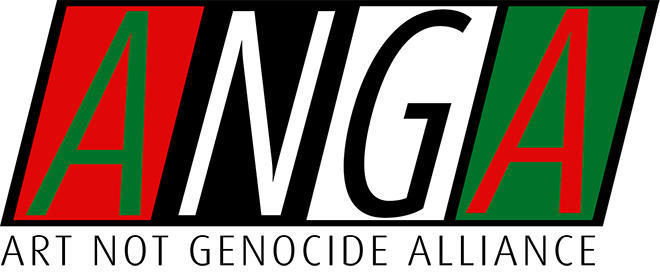Who is ANGA?
ANGA is an international group of artists, curators, writers, and cultural workers who have come together to call for the exclusion of Israel at the Venice Biennale. ANGA is a collective with no sole authors. We commit to the power of collective action and the principles of shared responsibility. The more of us there are, the more of us there are.
Is Israel definitely participating in the Bienniale?
Yes. Several sources have confirmed that Israel will participate in an alternative pavilion, in the Arsenale, facilitated by the biennale. Israel's Ministry of Culture announced an open call for artists in August. The artistic team was announced in early December as artist Belu-Simion Fainaru and curators Sorin Heller and Avital Bar Shay.
What about the ceasefire, doesn't that change your campaign?
A "ceasefire" came into effect on 10 October 2025, which Israel has already violated nearly 400 times. Since then, over 300 Palestinians have been murdered by Israeli attacks. The delivery of aid – including tents, food, and medicine – remains heavily restricted. The population of Gaza is now living in 47% of its previous territory, in unacceptable conditions, with every aspect of their lives under Israeli brutal control.
The ceasefire has not stopped the ongoing genocide and Israel has not been held to account for its war crimes. We refuse to allow Israel to preserve its place on the international art world stage. The absolute isolation of Israel is more important than ever and can only be achieved through collective action.Has ANGA approached the Bienniale?
Yes, ANGA sent an initial letter demanding the exclusion of Israel to the Biennale on 2 October 2025. The Biennale has not responded.
What is the current status of the letter circulated among 2026 participants?
ANGA is asking 2026 Venice Biennale participants to sign a letter that demands the exclusion of the Israeli pavilion. Many participating artists and curators from the national pavilions have already signed. We will soon reach out to main exhibition artists.
If I sign the letter, does this mean I am expected to boycott the Biennale if management refuses to act on our demand?
The letter we are asking participants to sign right now is a simple and clear demand for the exclusion of Israel.We want to present the Biennale management with overwhelming evidence of support for this demand among participating artists, curators and art workers—to make clear to the Biennale that participants do not wish to share space with a state committing genocide.
Why are ANGA anonymous?
ANGA organisers are also artists, curators and art workers.Palestine solidarity organisers face extreme, targeted harassment, doxxing and legal threats from governments and the Zionist lobby, including from groups such as UK Lawyers for Israel and Canary Mission. Organisers can be surveilled and intimidated, threatened with deportation or receive safety threats. Anonymity protects ANGA’s most vulnerable and marginalised members and ensures our campaign remains focused on protesting against the cultural normalisation of Israel rather than the identities of individuals.
Is calling to exclude Israel from the Biennale anti-Jewish or antisemitic?
A national pavilion at Venice is an official cultural representation of the state in question. Calling for the exclusion of Israel from the Biennale is not anti-Jewish or antisemitic, neither is criticising the state of Israel for its actions. All 193 Member States of the United Nations are responsible to obey international law and Israel cannot be the only exception. Asking for the exclusion of Israel's state-funded pavilion is a matter of holding an apartheid state, presently on trial at the International Court of Justice for plausible genocide against Palestinians in Gaza, accountable. ANGA's campaign is about addressing human rights, equality, and justice, rather than targeting individuals based on their religion or ethnicity.
Isn’t art a bridge between cultures, and between people?
A bridge cannot connect an apartheid state occupier with those it occupies. Equal partners can perhaps strive to connect by a bridge, but in the asymmetrical context of an occupier that forces degraded terms of existence on the occupied, there can be no bridge. The reduction of art's function to that of a mere "bridge" is a deceptive facade, ultimately catering to agendas of diplomacy and power. The systematic destruction of cultural institutions and essential infrastructure in Palestinian territories undermines any semblance of cultural exchange and perpetuates a cycle of injustice and inequality. In the face of such grave offenses, mere artistic expressions cannot bridge the chasm of suffering and loss experienced by Palestinians under occupation. No "bridge" can connect Palestinians to the libraries, galleries, mosques, bookshops, and schools that Israel has destroyed and eradicated in Gaza. Art cannot transcend the contexts in which it exists.
Can I contact ANGA?
Yes, email us at artnotgenocidealliance@proton.me
